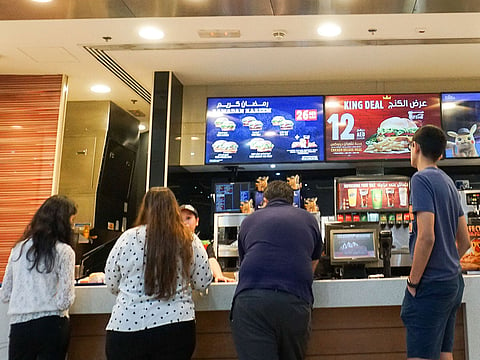Calorie display in Dubai menus to influence 1 billion food decisions
Public health a shared responsibility of food businesses too: Dubai Municipality

Also In This Package
Dubai: The display of calories in Dubai menus is expected to influence more than one billion food decisions a year, according to Dubai Municipality.
The rule mandating Dubai eateries to declare calories of each item in their menus will be effective from January 1, 2020, with an early deadline of November 1 set for businesses with more than five branches.
The primary objective of the rule is to help diners make healthy food choices for reducing obesity and related diseases.
The Food Safety Department of Dubai Municipality hopes to make a big difference in food decisions taken by diners just with the knowledge of how much of calories they consume.
“The population of Dubai is three million. As per our calculations, we expect more than one billion food decisions to be based on the calorie count displayed in menus in a year,” Iman Ali Al Bastaki, director of the department told Gulf News.
During the six months of the World Expo 2020 starting on October 20, 2020, Dubai is expecting to welcome 25 million visitors. Hence, the number of food decisions taken based on displayed calories is expected to be multibillion during the Expo.
“Tourists will generally eat out. With people eating out three times a day, we expect this move to help them choose healthy options for every meal of the day,” Al Bastaki explained.
“This will highly impact the food businesses in a positive way. By declaring nutritional information, they will be encouraged to provide healthier food.”
For example, a food outlet making a traditional meal with a lot of oil will have to display a high caloric value for the meal. When consumers prefer to go for another meal with less calories or a smaller portion of the same meal, the establishment will encourage its chefs to reduce the use of oil, thereby reducing the calories and providing a healthier meal.
“That is how we would like to help people with better information and at the same time push food businesses to provide healthier items,” said Al Bastaki.
“Public health is a shared responsibility. We want food establishments also to shoulder it.”
Towards a healthy Dubai
Dubai, which will be the first emirate in the UAE to implement the rule, referred to similar practices in countries like the US and Canada before announcing it, Al Bastaki revealed.
“We already have a system of having nutrition labelling system that displays all nutritional values [such as sugar, sodium, fat etc] in packaged food items. But for cooked or prepared food that is ready-to-eat, what we want for now is the basic declaration of calories. As a first step, even that can make a big difference.”
She explained that the municipality wants to ensure the readiness of the market before going to the next level of detailed nutrition labelling in cooked foods.
“Our aim is to increase the availability and accessibility of healthy food in Dubai. We are working with food businesses on different initiatives and everything goes hand in hand towards that goal. This rule is also part of that holistic approach and complementary to our other projects.”
Healthy meal project in school canteens, initiative to reduce salt and sugar content in bakery items and verification of claims about healthy food items are some of the other projects that Dubai Municipality has been working on in this regard, Al Bastaki explained.



